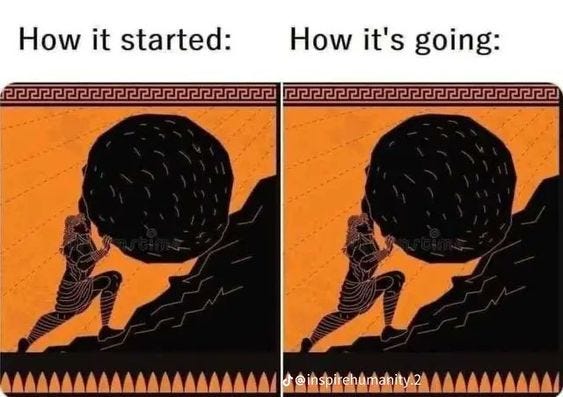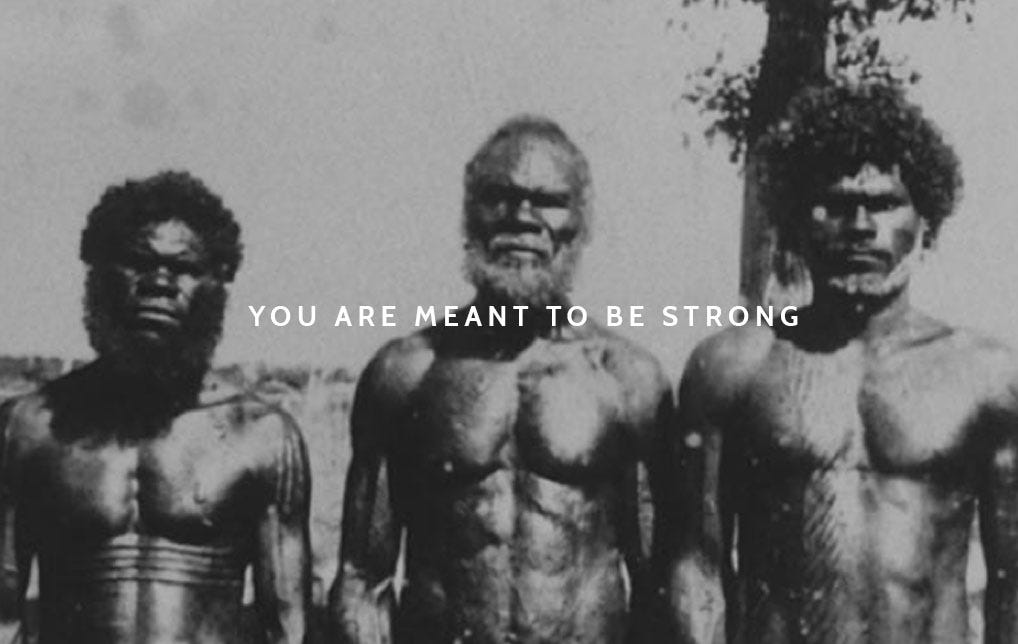The Most Boring Value
I find discipline one of the most boring values to philosophize about. It’s like, okay, we get it: do what you do not want to do. It is not exciting, glamorous, or sexy, which is the whole point. The Nike slogan sums it up: “Just do it.” However, neglecting discipline comes at your peril. I am thinking about it now because I am focusing on my physical fitness and treating my body with greater respect. Such respect necessitates discipline.
When you search “how to be disciplined” on the internet, you’ll encounter cheesy hustle narcissists signaling how disciplined they are, as if they are competing for “the most disciplined” trophy. Or you’ll find the usual self-help gurus asking for your money so they can tell you to just do it. I still find practical wisdom in the self-help scene, but I increasingly despise it as a whole, viewing it as an existential hazard. I see three sins of self-help:
It leverages a lie—you are not good enough, and the prevalent shame that stems from it. This shame is what self-help authors capitalize on. Despite whatever practical wisdom is imbued, shame permeates throughout.
It is littered with toxic positivity, rightly arguing for the efficacy of aggressive positivity in specific domains, but when it bleeds into all areas of life, it shuts down the whole person in favor of being on the treadmill of endless self-improvement.
It aims toward success and greatness, while mere accomplishment and goodness are good enough for most people on most occasions. Without explicit competition, these aims foster a race to the top of an imaginary hierarchy, where shame-fueled fools compete in status games that are, at best, irrelevant and, at worst, toxic.
Overall, self-help sucks. I hesitate to write about discipline, fearing that some of these sins might be conveyed. However, cleaning up my thinking, even on straightforward values, is helpful. I’ll provide some theoretical musings and then offer three principles. Firstly, I like to ensure my definitions are precise when considering any value. Here is my current definition of discipline:
Doing what is perceived to be necessary, even when it is unpleasant.
Philosopher Harry Frankfurt’s notion of first-order and second-order desires is relevant here. First-order desires are basic, immediate wants, such as the desire to eat a sugary treat. In contrast, second-order desires are reflective desires about those first-order wants, such as the desire to want to eat a healthy meal instead.
Discipline involves an interplay between first-order and second-order desires. The first-order desire is the inclination to avoid doing something in favor of something more pleasurable (the sugary treat). The second-order desire is the determination to overcome this initial resistance and do it anyway, despite not feeling motivated (the healthy meal). This understanding may make discipline seem like an unquestioned good, but it is not.
Discipline is a value, not a virtue. I understand virtue as a value that is always good. Being disciplined is not always good; it can be foolish, something the self-help gurus fail to tell you. Foolish discipline is overworking until burnout, “crushing” workouts that reliably lead to injury, and going on a starvation diet because “nothing tastes as good as skinny feels.”
That said, discipline is important and absolutely necessary for virtue. It is also hard, which is why it is presented as a constant bait in the predatory self-help industry. For those looking to be more disciplined, I have three principles…
First principle: You do not have to do that.
Life is not some BuzzFeed listicle of 100 things you must do before you die. The majority of stuff we are pressured to do, we do not have to do. Just say no. All these self-help gurus implore us to be more disciplined, but they sneak in success stories to illustrate the fruits of discipline, tacitly implying we need to aim to have a storied life similar to the individuals they highlight.
We all do not need to be accomplished as Michael Jordan or Steve Jobs. Sure, be inspired when inspiration is warranted, but replicating the specific feats or lifestyles of the hyper-successful is a foolish attempt for most people. Discipline is often good, but disciplining oneself to replicate someone else’s life story is bullshit.
Second principle: Saying “no” gives “yes” a chance.
If the first principle is about resisting the pressure to be disciplined in unnecessary activities, this principle is about refusing to engage in activities you feel compelled to do but know you shouldn’t be doing. Whether it’s food that shouldn’t be in our bodies or memes that shouldn’t occupy our minds, we often say yes to things that aren’t in our best interest. Despite knowing better, many of us still act against this understanding. The good news is that the solution is simple: the word no.
No is such a beautiful word. Saying no, and more centrally, embodying no, attracts the right amount of yes. I love saying no—with my words, my eyes, my vibe. No, no, no. Our culture is overly permissive with the word yes, a consequence of consumerist culture and relentless marketing campaigns designed to weaken our will. However, saying no is what enables us to say yes authentically. It’s as if a firm no is the guardian of a beautiful yes. Steve Pressfield aptly captures this idea when he says, “Yes lives in the land of no.”
Third principle: Discipline your body, and everything else follows.
The three main life domains where people usually lack discipline intimately entail the body: exercise, diet, and sleep. Address these modernity problems, and you will not be thinking about discipline in the abstract anymore. The open secret is that you do not have a discipline problem; you have a challenge with your body for reasons outside your control.
Our bodies are not meant for certain environments. We are not meant to be sitting on our asses for long portions of the day, staring into plastic portals, having our minds invaded by copious amounts of memes. Yet, many livelihoods are tethered to lifestyles that weaken our bodies. It may feel unnatural to go to a man-made gym, but we need to navigate our unnatural environment.
This final principle brings me back to the beginning of this entry. I exercise regularly enough, but not with the appropriate discipline for a less foolish life. Now that I have met my post-philosophy moment, it is time for a wise body—that is, a well-defined body that can carry the weight of an unexamined world.
There’s nothing else to say on the matter of discipline except something boring like “just do it,” and, for my part, that is exactly what I will do.
If you enjoyed this entry, I imagine you'll also enjoy this one:
What Would You Do if You Had Goggins-Level Discipline?
My first exposure to David Goggins came from his initial appearance on Joe Rogan's podcast. My immediate reaction was: "WTF, is this guy for real?" He's endured three Hell Weeks, completed countless ultra-marathons, set the record for the most pull-ups, and still wants more.
Additionally, the Collective Journaling series will conclude this Wednesday, just a day before summer begins. This series has been going strong for three years, and we’ll have a concluding ritual on Wednesday to say goodbye. If you’d like to attend the final three sessions, you can do so for free:
Collective Journaling: The Final Sessions. Monday-Wednesday @ 8 AM Eastern. RSVP here.






